The first Superseries of the Olympic qualification season becomes the last one right before the Games. Our preview specialist, Aaron Wong, addresses why players turn up when qualification no longer matters.
Photos: Badmintonphoto
Planting Seeds of Certainty
Badminton’s top players are using this Australian Open to vie for a seeding at Rio De Janeiro Olympic Games. How is that important? Although not foolproof, it is about reducing the risk of an early exit on the biggest stage as well as having a chance to acclimatise to local conditions.
Take, for example, the opening round of last year’s Australian Open, where world #9 Viktor Axelsen drew world #2 Lin Dan. It’s this supreme level of difficulty for an early round that both, or any player for that matter, would have wanted to avoid. Had Viktor been one rank higher, he’d have been seeded and Lin Dan could well have been spared ad-libbing a premature goodbye speech.
Securing eighth seed for badminton singles at the Olympic Games affords a world of extra certainty – as does being the second seed – because you know one person for certain is on the other side of the draw and any possibility of meeting can only be a medal round.
Monotony into affection
Chen Long is undefeated in Australia; Lin Dan is defending Olympic champion; Lee Chong Wei, meanwhile, is king of the Superseries but one short of a complete collection (of the currently existing 13 events) without an Aussie edition. The more interesting way to look at it is that, relative to one another, the three men are the defensive, all-rounder, and offensive types respectively.
In any given year so far this decade, the wished-for finale is any combination of these three men. However, a Lin Dan-Lee Chong Wei spectacle is the sentimental favourite spectators want because either of them retiring as a consequence of Rio would mean there may be only as many encounters left as there are games that comprise one badminton match. Or, already none forevermore — please don’t shoot the messenger!
Semi-finals Saturday has become the hottest ticket because that’s when Lee’s and Lin’s paths in the draw collide in what would be their 37th duel. Monotony morphs into affection in the possible light of imminent farewells. Watching either man playing live in the flesh is so awe inspiring and far superior to a Youtube broadcast that even non-fans who have experienced it would agree it exceeds expectations and really is something to Wow! about. And, what of both on the same court together? Miss it if you live in Sydney and there’s perhaps no further chance to relive it.
Should Lin and Lee both retire soon, it’s extraordinary that their meetings right up until the end were never not the headline act. Other legends and former world number 1s like Chen Jin, Peter Gade or Taufik Hidayat finished their careers with less fanfare because they weren’t genuine contenders at the very end and also finished at different times whereas Lee and Lin are roughly the same age, stake out second and third spots on the world rankings, and between them have prevented anyone else from claiming half of the one dozen country designate Superseries titles on offer since the previous Australian Open.
Meal tickets
Olympic Games or not, life goes on for badminton’s independent professional players, who by definition don’t live off a state stipend and win they must to afford their mortgages. The tune of badminton’s second largest total prize money, which the Aussie Open has supplied since its Superseries incarnation in 2014 – just without the Premier label – motivates the fit top 10 stars of yesteryear like Malaysian duo Koo Kien Keat / Tan Boon Heong and singles proponent Nguyen Tien Minh from Vietnam, quite a few Indonesian pairs, non-Danish Europeans and the odd Canadian (Michelle Li).
To paraphrase Donna Summer’s blue collar anthem: they work hard for the money. Don’t write them off despite other names having eclipsed them in the spotlight because these independents are pragmatic. To win bigger prize money and make the trip worthwhile, they’d have realised the endeavour entails spending personal funds initially to fly there and fully anticipated that at Superseries level they must be prepared to tackle a “final” in the first round. After all, even the seeded players and recent Superseries champions are not immune from such a plight – read 2015 Australian Open preview.
Early women’s singles matches of note
R32: Carolina Marin (ESP) [1] vs. Akane Yamaguchi (JPN)
R32: Nozomi Okuhara (JPN) [5] vs. Sun Yu (CHN)
R32: Wang Yihan [4](CHN) vs. Kirsty Gilmour (SCO)
Rendezvous, not déjà vu
This year’s Singapore Superseries men’s singles winner and independent player Sony Dwi Kuncoro of Indonesia has the opening round honour in Sydney of a rendezvous with the current All England runner-up Tian Houwei in what will be their first ever encounter.
Both are similar in staying steady and playing an understated game, so how willing is Kuncoro going to be at making the play mid-rally whence he typically invents in not obviously heated or sped up fashion? Look for how well Tian reacts to the unexpected shots that can be produced by a seasoned and naturally gifted opponent. As we’ve seen before locally against Lee Chong Wei and Srikanth Kidambi, Tian becomes addictively interesting to watch the moment he chooses to double his rock solid intensity. This happens in response to the other side cranking up the offensive volume or running speed, which are essentially patterns he can thrive on to outlast with consistency and fitness, except that Kuncoro may not offer those kinds of triggers.
Early men’s singles matches of note
Qualification: Simon Santoso (INA) vs. Huang Yuxiang (CHN)
R32: Chou Tien Chen (TPE) [7] vs. Anthony Ginting (INA)
R32: Tian Houwei (CHN) [6] vs. Sony Dwi Kuncoro (INA)
R32: Lee Chong Wei (MAS) [1] vs. Jonatan Christie (INA)
Coming of Age
Mixed doubles is the last of the five disciplines to embrace the recent era of a variety of champions breaking through. 11 of the top 12 mixed pairs have been Superseries champions, apart from Korea’s Shin Baek Cheol who has been Asian Champion, which is equally impressive if not more prestigious.
The longstanding stranglehold on top level mixed by China’s Zhao Yunlei / Zhang Nan and Ma Jin / Xu Chen, Indonesia’s Liliyana Natsir / Tontowi Ahmad and Denmark’s Christinna Pedersen / Joachim Fischer Nielsen has relaxed. The 2013 and 2015 Australian Open champions from Korea and Hong Kong paved the way for the gate crashers with England and Indonesia’s second pair Debby Susanto / Praveen Jordan joining the party.
Top seeds Natsir/Ahmad have a slightly better draw for going further compared to second seed Danes Pedersen/Fischer-Nielsen, who have a bunch of in-form lower seeds, experienced, or energetic pairs to look forward to no matter which ones cancel out each other in the adjacent eighth or quarter. Amongst these, the ambitious 8th seeds Huang Yaqiong / Lu Kai could be more than a handful at the semis.
The top seed should be extra wary of Chen Qingchen (pictured) and Zheng Siwei if they go through to the quarter-finals because this Chinese pair are young but no so green. All England champions Susanto/Jordan benefit the most in the top half of the draw because if things go according to seeding they’d mainly enjoy the predictability of playing compatriots.
Early Mixed Doubles Matches of note
R32: Gabrielle Adcock / Chris Adcock (ENG) [5] vs. Chae Yoo Jung / Choi Solygu (KOR)
R32: Ma Jin / Xu Chen (CHN) [3] vs. Line Kjaersfeldt / Kim Astrup (DEN)
R32: Goh Liu Ying / Chan Peng Soon (MAS) [7] vs. Leanne Choo / Robin Middleton (AUS)
R32: Tang Jinhua / Liu Yuchen (CHN) vs. Naoko Fukuman / Keigo Sonoda (JPN)
Non-extraneous vs. Uninhibited
Badminton at the Olympic Games, with its global diversity motto and smaller draws, increases the odds that gold will be taken by established athletes but that needn’t be the script for a Superseries. A nation’s second or third rankers or those ranked in the teens can pull off a special win and such breakthrough performances are most likely in the disciplines containing women. China has a track record of scratch pairs turning into overnight sensations.
This last Superseries before Rio is one time the best would welcome a difficult draw at every turn. Strokes and fitness aren’t the only thing athletes must practice. An effective mentality for absorbing pressure and managing distractions is equally important and the Olympic fortnight supplies that aspect in spades more than any badminton tournament. Turning on and staying in the Zone is what the fêted players are sharpening in Sydney and the most beneficial thing is to expose them to uninhibited fearlessness from the rest.
The conspicuous presumption that the Olympians won’t dial up their utmost abilities is true to the extent of performing desperate heroics. But there’s a lot to be said for the knack of pulling through without extraneous effort, and especially for players doing double doubles duties, it is a skill to be turned on when needed. For example, last year Korea’s Kim Ha Na somehow dragged out a second game for as long as 19-21 in order to catch her breath.
Early Level Doubles Matches of note
WD R32: Setyana Mapasa / Gronya Somerville (AUS) vs. Puttita Supajirakul / Sapsiree Taerattanachai (THA)
MD R32: Fu Haifeng / Zhang Nan (CHN) [3] vs. Takeshi Kamura / Keigo Sonoda (JPN)
MD R32: Angga Pratama / Ricky Karanda [6] vs. Lee Sheng Mu / Tsai Chia Hsin (TPE)
For somebody who has yet to, winning a Superseries takes an athlete’s mindset to a new level of self-belief so who cares whether the spectators think that an opponent wasn’t trying as hard this time around. Psychologically, it’s all academic afterwards.
This Australian Open is a golden opportunity for China’s He Bingjiao in women’s singles, Chen Qingchen in women’s and mixed, Kim Astrup / Anders Skaarup Rasmussen of Denmark in men’s doubles, Korea’s Chae Yoo Jung / Choi Solgyu (pictured) in mixed, and (dare I say it) the time is ripe for a first ever teenage men’s singles Superseries champion. As it didn’t happen this week in Indonesia, there’s another chance next week in Sydney for Indonesia’s Jonatan Christie, which of course necessitates ruining the Lee-Lin party.
Click here to see the complete draws
![AUSTRALIAN OPEN 2016 Preview – Wreaking motivation on the Rio-bound The first Superseries of the Olympic qualification season becomes the last one right before the Games. Our preview specialist, Aaron Wong, addresses why players turn up when qualification no longer matters. […]](http://www.badzine.net/wp-content/uploads/ngg_featured/20150525_0947_AustralianOpen2015-RS_L4332_rotator.jpg)

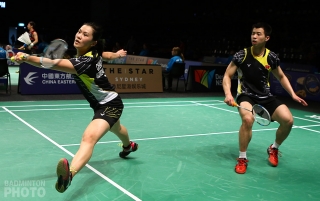
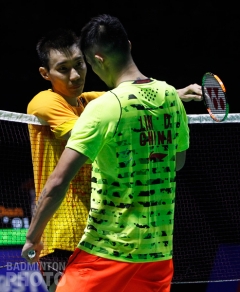
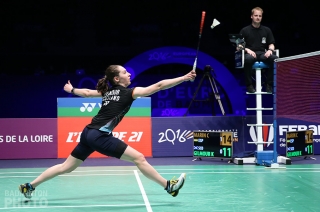
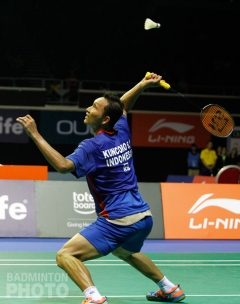
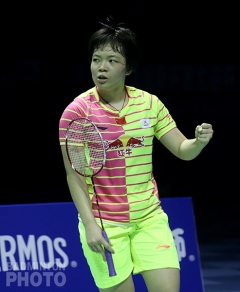
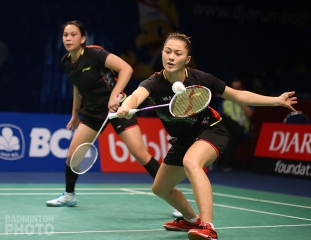
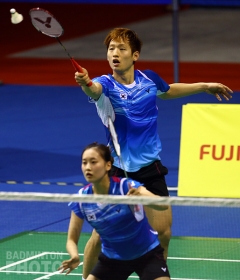

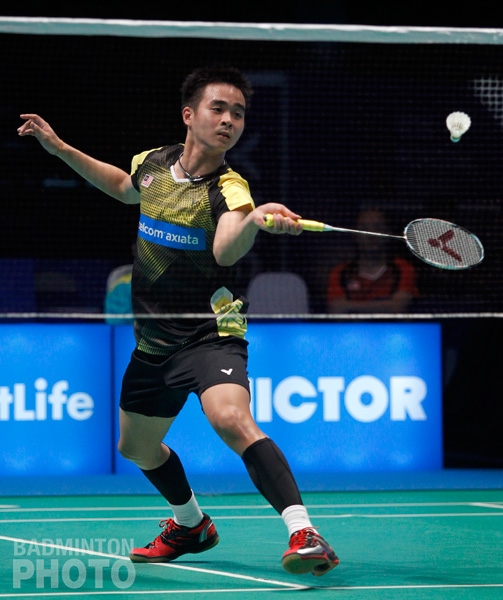
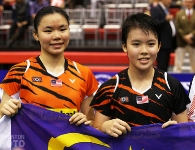
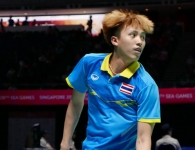
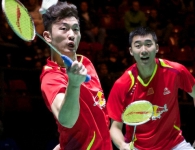
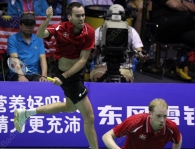
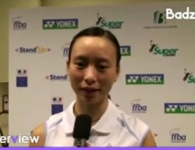
Leave a Reply